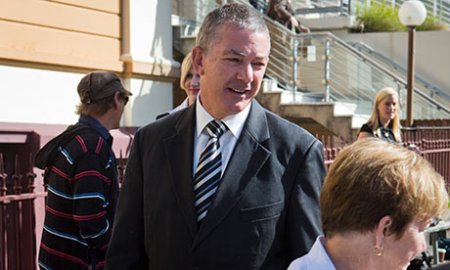The Nsw Enquiry Continues (or: Bias or Lazy Journalism?)
By Lewis Blayse
In her opening address to the second session of the NSW government enquiry into clerical child sexual abuse in the Newcastle-Maitland diocese, Commissioner Ms Cunneen said: “The sexual abuse of children should no longer be a crime for which the conspiracy of silence continues to the grave. It has a devastating and long-lasting effect on victims and their families and on the community generally.” Ms Cunneen then encouraged anyone with information about such crimes to contact the commission. Yesterday, proceedings were dominated by evidence from Detective Chief Inspector Peter Fox, whose revelations triggered the enquiry and the Royal Commission. In the first session last month, Mr Fox gave evidence and then was followed by several other NSW police officers who were critical of him (see previous posting). In the present session, the process was extended by a couple more officers. Fortunately, Mr. Fox was afforded the dignity of another appearance to reply to some of the criticism and to expand on his previous testimony. This set back those who would wish that, in formation of public opinion, quantity would outweigh quality of evidence. The two priests specifically referred to in the enquiry’s Terms of Reference were Fr. McAlinden (see yesterday’s posting) and Fr. James Fletcher. Detective Chief Inspector Fox focused on Fr. Fletcher in this appearance. In 2008 Fr Fletcher pleaded not guilty in the district court but a jury found him guilty of all nine charges. Two appeals against his conviction failed and Fr Fletcher died in jail. In evidence earlier in the day before Commissioner Margaret Cunneen, Detective Chief Inspector Fox said he suspected Maitland Newcastle Bishop Michael Malone “deliberately” tipped off Fr Fletcher in 2002 about police investigating child sexual abuse allegations against him. The enquiry heard that, in 2005, the then Maitland-Newcastle Bishop Michael Malone told Fletcher that someone had been to police complaining they had been sexually abused by him. Peter Fox said the victim’s mother was “most distraught” that Fletcher had been told the name of the complainant. Fr Harrigan, Monsignor Jim Saunders and Fr Bill Burston were at the meeting when Fr Fletcher was told of the investigation. The detective told the inquiry he did not yet have a statement from the victim and it was “a major disruption” to the investigation. He labeled the move “deliberate and sinister”, saying it “forewarned Fletcher” and “potential evidence was destroyed”. He also said the crucial “element of surprise” was “robbed” from investigators. Detective Chief Inspector Fox said that when he asked Bishop Malone about why he had gone out to speak to Fr Fletcher, he said he was concerned about Fr Fletcher’s welfare and wanted to offer him pastoral care. When asked whether he thought Bishop Malone’s actions were a deliberate attempt to interfere with the investigation, Mr. Fox said “it seemed fairly deliberate” as the warning gave him a chance to get his story together and took away the police investigator’s element of surprise. Now, I will change to the first person, which I sometimes do when it is the only appropriate format. It is also an indication that it is only my opinion, and is not presented with the same level of legitimacy as the usual postings. I hope the reader bears with me on this. I recently received an e-mail from someone who was, probably sincerely, trying to convince me that I was overly-sympathetic to Peter Fox. Perhaps, I have been, but I would like to think not. An old school-friend, who became a journalism ethics professor, once told me that, sometimes, what appears, on the surface, to be unethical (i.e. biased) reporting, can sometimes merely be a product of what is usually referred to as “lazy journalism.” It does, nevertheless, have the same effect on truth and people’s feelings. Previous postings have attempted to draw attention to the pitfalls awaiting the unsuspecting mass-media journalist of being too close to the “official” information sources, such as the Catholic Church’s PR unit. It is too easy to become a lazy journalist in the new cost-conscious organisations, such as Rupert Murdoch’s News Ltd. Here, one article is re-printed in many publications, so there is uniformity of approach. Any error is compounded, and magnified. There is also the problem of the need for getting an article out quickly to be posted on-line. This also leads to sloppy journalism where a very limited range of sources are used to write the article. The easiest thing to do is to simply cut and paste from a media release. These factors appear to have surfaced in this week’s reportage of Detective Chief Inspector Fox’s evidence. Instead of going to the trouble of reporting on the details of Mr. Fox’s evidence given above, The Australian newspaper’s coverage focused on a minor error in his evidence concerning when he wrote up his notes into the form of an official report. It lead with the headline: “Detective Fox gave two versions on priest evidence”. The less cost-stressed Australian Broadcasting Corporation article gave a brief mention that “Detective Chief Inspector Fox was forced to correct some evidence given in private hearings earlier this year regarding a file note about a meeting with the former Bishop.” Other outlets, like Fairfax, did not mention it at all. The benefit of the doubt is given to Mr. Murdoch’s “The Australian” newspaper that this was indeed a case of “lazy journalism”, rather than biased reporting. Unfortunately, it is the second example of this nature from that publication. A third example may convince some that I have given the newspaper too much of a benefit of the doubt. [Postscript: Is this a trend? In Greece, paedophilia is considered to be a “disability” which entitles the “sufferer” to a state disability pension.]
|
.
Any original material on these pages is copyright © BishopAccountability.org 2004. Reproduce freely with attribution.
